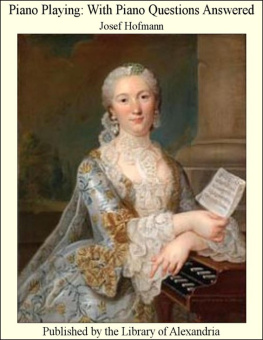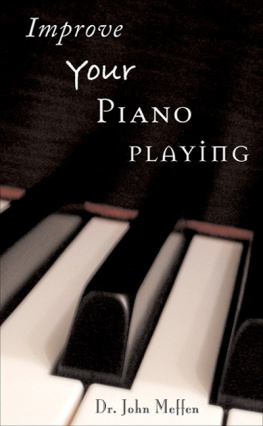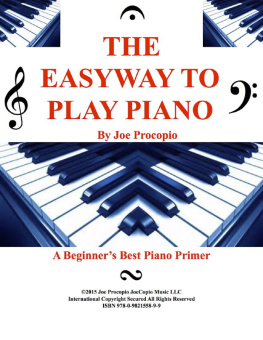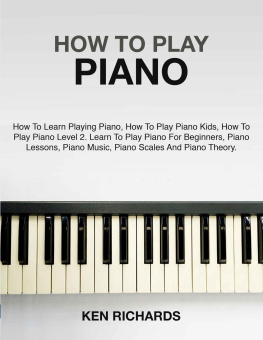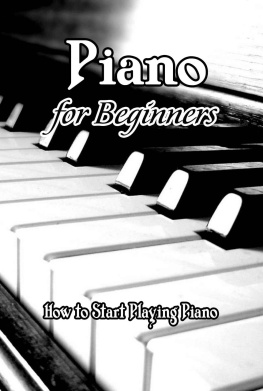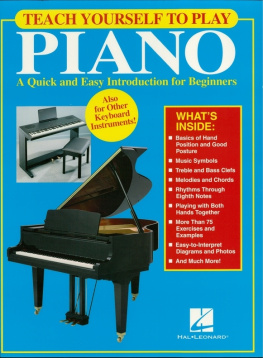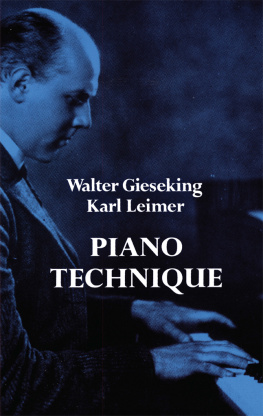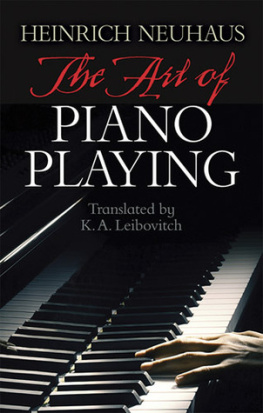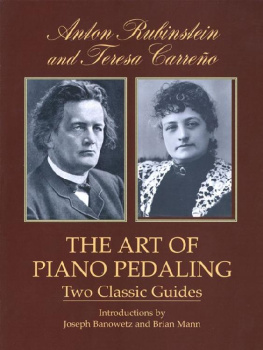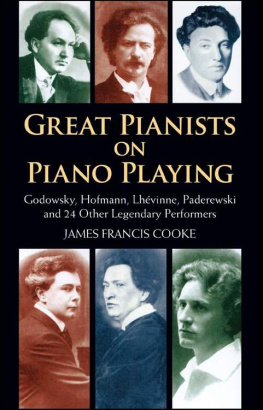Piano Playing: With Piano Questions Answered
Josef Hofmann
DEDICATION
TO MY DEAR FRIEND CONSTANTIN VON STERNBERG
A FOREWORD
This little book purposes to present a general view of artistic piano-playing and to offer to young students the results of such observations as I have made in the years of my own studies, as well as of the experiences which my public activity has brought me.
It is, of course, only the concrete, the material side of piano-playing that can be dealt with herethat part of it which aims to reproduce in tones what is plainly stated in the printed lines of a composition. The other, very much subtler part of piano-playing, draws upon and, indeed, depends upon imagination, refinement of sensibility, and spiritual vision, and endeavours to convey to an audience what the composer has, consciously or unconsciously, hidden between the lines. That almost entirely psychic side of piano-playing eludes treatment in literary form and must, therefore, not be looked for in this little volume. It may not be amiss, however, to dwell a moment upon these elusive matters of sthetics and conception, though it be only to show how far apart they are from technic.
When the material part, the technic, has been completely acquired by the piano student, he will see a limitless vista opening up before him, disclosing the vast field of artistic interpretation. In this field the work is largely of an analytical nature and requires that intelligence, spirit, and sentiment, supported by knowledge and sthetic perception, form a felicitous union to produce results of value and dignity. It is in this field that the student must learn to perceive the invisible something which unifies the seemingly separate notes, groups, periods, sections, and parts into an organic whole. The spiritual eye for this invisible something is what musicians have in mind when they speak of "reading between the lines"which is at once the most fascinating and most difficult task of the interpretative artist; for, it is just between the lines where, in literature as in music, the soul of a work of art lies hidden. To play its notes, even to play them correctly, is still very far from doing justice to the life and soul of an artistic composition.
I should like to reiterate at this point two words which I used in the second paragraph: the words "consciously or unconsciously." A brief comment upon this alternative may lead to observations which may throw a light upon the matter of reading between the lines, especially as I am rather strongly inclining toward the belief in the "unconscious" side of the alternative.
I believe that every composer of talent (not to speak of genius) in his moments of creative fever has given birth to thoughts, ideas, designs that lay altogether beyond the reach of his conscious will and control. In speaking of the products of such periods we have hit upon exactly the right word when we say that the composer "has surpassed himself." For, in saying this we recognise that the act of surpassing one's self precludes the control of the self. A critical, sober overseeing of one's work during the period of creation is unthinkable, for it is the fancy and the imagination that carries one on and on, will-lessly, driftingly, until the totality of the tonal apparition is completed and mentally as well as physically absorbed.
Now, inasmuch as the composer's conscious will takes little or no part in the creating of the work, it seems to follow that he is not, necessarily, an absolute authority as to the "only correct way" of rendering it. Pedantic adherence to the composer's own conception is, to my mind, not an unassailable maxim. The composer's way of rendering his composition may not be free from certain predilections, biases, mannerisms, and his rendition may also suffer from a paucity of pianistic experience. It seems, therefore, that to do justice to the work itself is of far greater importance than a slavish adherence to the composer's conception.
Now, to discover what it is, intellectually or emotionally, that hides itself between the lines; how to conceive and how to interpret itthat must ever rest with the reproductive artist, provided that he possesses not only the spiritual vision which entitles him to an individual conception, but also the technical skill to express what this individual conception (aided by imagination and analysis) has whispered to him. Taking these two conditions for granted, his interpretationshowever punctiliously he adhere to the textwill and must be a reflex of his breeding, education, temperament, disposition; in short, of all the faculties and qualities that go to make up his personality. And as these personal qualities differ between players, their interpretations must, necessarily, differ in the same measure.
In some respects the performance of a piece of music resembles the reading of a book aloud to some one. If a book should be read to us by a person who does not understand it, would it impress us as true, convincing, or even credible? Can a dull person, by reading them to us, convey bright thoughts intelligibly? Even if such a person were drilled to read with outward correctness that of which he cannot fathom the meaning, the reading could not seriously engage our attention, because the reader's want of understanding would be sure to effect a lack of interest in us. Whatever is said to an audience, be the speech literary or musical, must be a free and individual expression, governed only by general or is it sthetic laws or rules; it must be free to be artistic, and it must be individual to have vital force. Traditional conceptions of works of art are "canned goods," unless the individual happens to concur with the traditional conception, which, at best, is very rarely the case and does not speak well for the mental calibre of the easily contented treader of the beaten path.
We know how precious a thing is freedom. But in modern times it is not only precious, it is also costly; it is based upon certain possessions. This holds as good in life as in art. To move comfortably with freedom in life requires money; freedom in art requires a sovereign mastery of technic. The pianist's artistic bank-account upon which he can draw at any moment is his technic. We do not gauge him by it as an artist, to be sure, but rather by the use he makes of it; just as we respect the wealthy according to the way in which they use their money. And as there are wealthy people that are vulgar, so there may be pianists who, despite the greatest technic, are not artists. Still, while money is to a gentleman perhaps no more than a rather agreeable adjunct, technic is to the pianist's equipment an indispensable necessity.
To assist young students in acquiring this necessity, the following articles were written for The Ladies' Home Journal, and for this form I have gone over them and corrected and amplified. I sincerely hope that they will help my young colleagues to become free as piano-playing musicians first, and that this, in its turn and with the help of good fortune in their career, will bring them the means to make them equally free in their daily life.
Josef Hofmann.
THE PIANO AND ITS PLAYER
The first requisite for one who wishes to become a musicianly and artistic pianist is a precise knowledge of the possibilities and limitations of the piano as an instrument. Having properly recognised them both, having thus staked off a stretch of ground for his activity, he must explore it to discover all the resources for tonal expression that are hidden within its pale. With these resources, however, he must be contented. He must, above all, never strive to rival the orchestra. For there is no necessity to attempt anything so foolish and so futile, since the gamut of expressions inherent to the piano is quite extensive enough to vouchsafe artistic results of the very highest order, provided, of course, that this gamut is used in an artistic manner.
Next page
